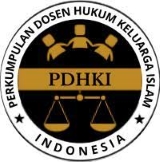ANALISIS FATWA MAJELIS ULAMA INDONESIA (MUI) DENGAN PENDEKATAN ISTISHAB
Abstract
The main issue that is discussed in this paper is istishab. There are two research questions. First, does the Indonesian Ulema Council (MUI) use istishab in issuing its fatwas? If so, Second, on what issues does the Indonesian Ulema Council (MUI) use istishab? The research method is with Library Research. The results of this study show several findings, namely: The Indonesian Ulema Council uses istishab in issuing its fatwas. The use of istishab elements in the fatwa of the Indonesian Ulema Council is in matters of Family Law 1975-2010, there are 10 (ten) fatwas, namely on the issue of mixed marriages, three divorces at once, iddah death, adoption (appointment of children), marriage procedures, Mut'ah marriage, transgender status, inheritance from siblings/brothers with a single daughter, inheritance from different religions, and tourism marriage. Thus, according to the author, the Indonesian Ulema Council still tends to be conservative in issuing its fatwas. This can be seen from the dominance of the istishab method with an attitude that maintains the circumstances, habits and traditions that apply in the past for the present. So, this shows that the influence of the Shafiʻiy school is still very strong in Indonesia. This is evidenced by the fact that when issuing ijtihad in issuing fatwas, the Indonesian Ulema Council still uses istishab as a legal argument or method. Thus, the authors recommend that in issuing fatwas do not tend to be conservative. Because when it dominates, of course it has implications for the development and thinking of Islamic law in general. For example, the thought of Islamic law will find it difficult to move, as if circling in place, in the end Muslims will be considered old-fashioned and backward from other people, because they are considered unable to adapt to the times. Meanwhile, what is expected by the ummah is that MUI can become more innovative on issues that are increasingly complex and global, but without violating the teachings that have been emphasized by the Qur'an and Hadith of the Prophet SAW, in the sense that it must be within the limits set methodologically tolerated, in order to become a bridge for the advancement of the people and nation of Indonesia.
Keywords
Full Text:
PDFReferences
Abd. Rahman Dahlan, Ushul Fiqh, (Jakarta: Amzah, 2010), Cet ke- 1.
Abdu al-Wahhȃb Khallȃf, ʻIlmu Uṣûl al-Fiqh, (Singapura: al-Haromain, 2004).
Abdul Ghofur Anshori, et al, Hukum Islam: Dinamika dan Perkembangan di Indonesia, (Jokjakarta: Kreasi Total Media, 2008).
Abdullah Ahmed An-Naʻim, Dekonsruksi Syariʻah, penerje, Ahmad Suaedy dan Amiruddin Arrani, (Yogyakarta: LKIS, 1994).
Ajub Ishak, “Daya Serap Lembaga-Lembaga Fatwa di Indonesia Terhadap Masalah Hukum Kontemporer”, Al-Mizan,_11, 1 (Juni 2015).
Al-Syekh Muḥammad Riḍȃ al- Muẓaffar, Uṣȗl al-Fiqh, (Beirȗt: Ma’susat al-A’lȃ lilmaṭbȗ‘ȃt, 1990), Jilid 2.
Amir Saʻid al-Ṣiddiqiy, Mabȃhiṡ fi Aḥkȃm al-Fatwȃ, (Beirut: Dȃr Ibn Hazm, 1995).
Amir Syarifuddin, Ushul Fiqh, Jilid 2, (Jakarta: Kencana, 2014), Cet. ke-7.
Atabik Ali, et al, Kamus Kontemporer Arab-Indonesia, (Yogyakarta: Multi Karya Grafika, t.th.), Cet. ke- 9.
Dewan Redaksi Ensiklopedi Islam, Ensiklopedi Islam, (Jakarta: PT Ichtiar Baru Van Hoeve, 1994), Cet. ke- 2, Jilid 3.
Fathurrahman Djamil, Filsafat Hukum Islam, (Jakarta: Logos Wacana Ilmu, 1999).
Amir Syarifuddin, Pembaharuan Pemikiran Dalam Hukum Islam, (Padang: Angkasa Raya, 1993).
Gambaran Umum Organisasi MUI dalam Pedoman Penyelenggaraan Organisasi MUI, (Jakarta: Sekretariat MUI, 2002).
Hasbiyallah, Fiqih dan Ushul Fiqh: Metode Istinbȃth dan Istidlȃl, (Bandung: PT Remaja Rosdakarya, 2013).
Ibnu Manzur, Lisan al-‘Arab, (Beirut: Dȃr Ṣȃdir, tt.), h. Juz XV.
Imam Muslim, Ṣaḥih Muslim, (Beirut: Dȃr al-Fikr, tt.), Juz 1, h. 254. Lihat Juga: Ibnu Ḥajar al-Aṡqalaniy, Bulûg al-Marȃm min Adillat al-Aḥkȃm, (Jakarta: Gema Insani, 2013).
M. Daud Ali, Hukum Islam Pengantar Ilmu Hukum dan Tata Hukum Islam di Indonesia, (Jakarta: Rajagrafindo Persada, 1996).
Ma’ruf Amin, et al, Himpunan Fatwa Majelis Ulama Indonesia Sejak 1975, (Jakarta: Erlangga, 2011).
Mahjuddin, Masāil al-Fiqh: Kasus-Kasus Aktual Dalam Hukum Islam, (Jakarta: Kalam Mulia, 2012), Cet. ke-3.
Mahjuddin, Masāil al-Fiqh: Kasus-Kasus Aktual Dalam Hukum Islam, (Jakarta: Kalam Mulia, 2012), Cet. ke-3.
Majelis Ulama Indonesia, Himpunan Keputusan Musyawarah Nasional VII Majelis Ulama Indonesia Tahun 2005, (Jakarta: Sekretariat Majelis Ulama Indonesia, 2005).
Majelis Ulama Indonesia: http://mui.or.id/index.php/category/tentang-mui/profil-mui/.
Manna’ Khalil al-Qaṭṭan, Tȃrikh Tasyriʻ al-Islȃm, (Beirut: Mu‘assasah al-Risȃlah, 1992).
352Muḥammad ibn Ali ibn Muḥammad al-Syaukȃniy, Irsyȃd al-Fuḥȗl ila Taḥqiq al-Ḥaqq min ʻilm al-Uṣȗl, (Beirȗt: Dȃr al-Fikr, 1992).
Mohammad Atho Mudzhar, Fatwa-Fatwa Majelis Ulama Indonesia (Fatwᾶs of the Council of Indonesian Ulama): Sebuah Studi tentang Pemikiran Hukum Islam di Indonesia, 1975-1988 (A Study of Islamic Legal Thought in Indonesia 1975-1988, (Jakarta: INIS, 1993).
Muḥammad ʻAbdu al-Raḥmȃn ʻAbdu al-Munʻȋm, Muʻjam al-Muṣṭalaḥât wa al-Alfâẓ al-Fiqhiyyah, (Kairo: Dȃr al-Faḍilah, tt.), Juz 3.
Muḥammad Abû Zahrah, Uṣûl al-Fiqh, (ttp.: Dâr al-Fikri, tt.).
Muḥammad ibn Ali ibn Muḥammad al-Syaukȃniy, Irsyȃd al-Fuḥûl, (Beirut: Dȃr al-Fikr, 1992).
Muḥammad Sulaiman ʻAdullah al-Asyqar, al-Futya wa Manȃhij al-Ifta’, (Kuwait: Maktabat al-Mansȗr al-Islȃmiyyah, 1976).
Muḥammad Zakariyyȃ al-Bardȋsiy, Uṣûl al-Fiqh, (Kairo: Dȃr al-Ṡaqafah, tt.).
Nahar Nahrawi, et al (Ed), Fatwa Majelis Ulama Indonesia (MUI) Dalam Perspektif Hukum dan Perundang-Undangan, (Jakarta: Litang dan Pusliang Diklat Kemenag RI, 2012).
Nahar Nahrawi, et al (Ed), Fatwa Majelis Ulama Indonesia (MUI) dalam Perspektif Hukum dan Perundang-Undangang, (Jakarta: PUSLITBANG Dan Diklat Kemenag RI, 2014).
Nasrun Haroen, Ushul Fiqh, (Jakarta: Logos Wacana Ilmu, 1997).
Saidurrahman, “Istiṣḥȃb Sebagai Dasar Penetapan Hukum Islam: Sebuah Tinjauan Historis”, Jurnal Asy-Syir’ah,-_XXXXV, 1 (2011).
Totok Jumantro, et al, Kamus Ilmu Ushul Fikih, (Jakarta: AMZAH, 2009), Cet. ke- 2.
Wahbah al-Zuḥailiy, Uṣûl al-Fiqh al-Islamiy, (Damaskus: Dȃr al-Fikr, 1986), Juz 2.
Yusȗf al-Qaraḍawi, al-Fatwȃ Bain al-Inḍibât wa al-Tasayyub, (Kairo: Dȃr al-Ṣahwah, 1988), Cet ke-1.
DOI: https://doi.org/10.24952/almaqasid.v9i1.6981
Refbacks
- There are currently no refbacks.
Copyright (c) 2023 Jurnal AL-MAQASID: Jurnal Ilmu Kesyariahan dan Keperdataan

This work is licensed under a Creative Commons Attribution-ShareAlike 4.0 International License.



2.gif)


















